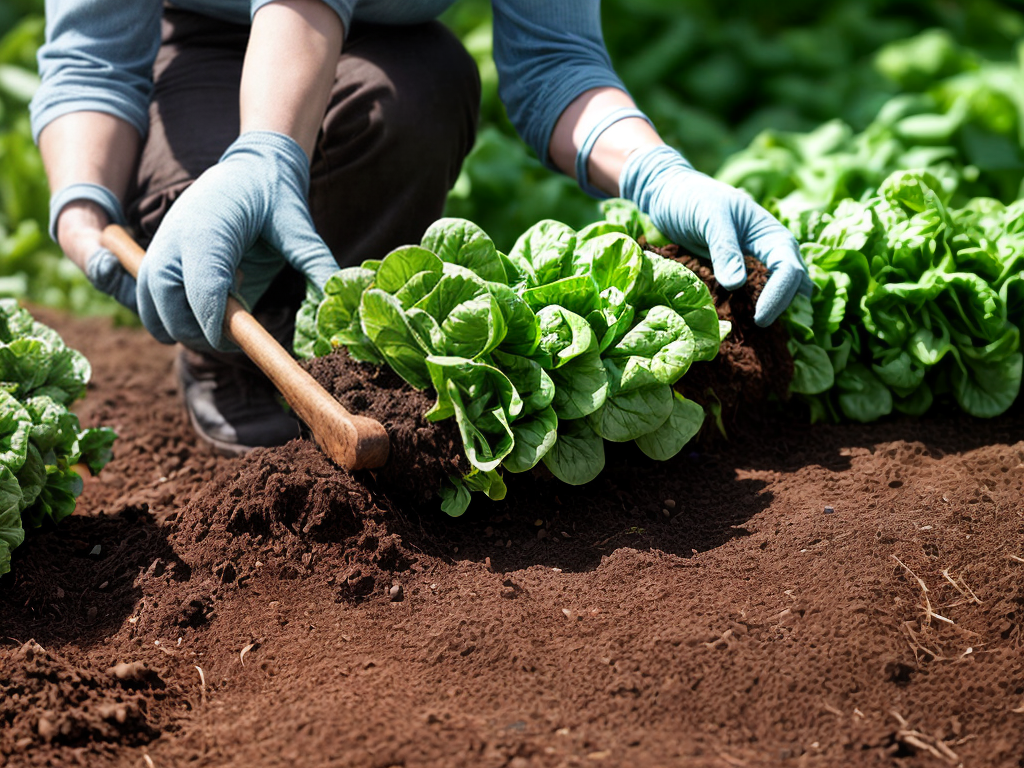
I’ve always been amazed at how much soil preparation can impact the success of growing organic vegetables. Did you know that properly preparing the soil can increase nutrient availability by up to 50%? It’s true! By taking the time to enhance soil structure, control weeds and pests, and balance pH levels, we can create an optimal environment for our plants to thrive. In this article, we’ll explore the key reasons why soil preparation is essential for growing healthy and sustainable organic vegetables.
Importance of Soil Preparation
To understand the importance of soil preparation, it is crucial to recognize that it lays the foundation for successful organic vegetable cultivation. Nutrient management and soil testing are key components of soil preparation that help ensure optimal conditions for plant growth. Nutrients are essential for plants to thrive, and proper nutrient management involves understanding the specific nutrient requirements of different vegetable crops. Soil testing plays a vital role in this process by providing valuable information about the nutrient levels present in the soil. By conducting soil tests, farmers can determine the nutrient deficiencies or excesses in their soil and make informed decisions about the appropriate fertilizers or amendments to use. This helps prevent nutrient imbalances that can negatively impact plant health and productivity. Therefore, nutrient management and soil testing are essential practices in soil preparation for organic vegetable cultivation.
Nutrient Availability for Organic Vegetables
When it comes to organic vegetables, nutrient availability is crucial for their growth and development. Soil fertility plays a significant role in providing the necessary nutrients for organic farming. By utilizing organic farming practices, such as composting and crop rotation, we can enhance the nutrient content of the soil, ensuring that our organic vegetables have access to the essential elements they need for optimal growth.
Soil Fertility and Nutrients
For organic vegetables, ensuring soil fertility and nutrient availability is crucial. Soil fertility refers to the ability of the soil to provide essential nutrients for plant growth. Without proper soil fertility, organic vegetables may not receive the necessary nutrients they need to thrive. This can result in stunted growth, reduced yields, and increased susceptibility to pests and diseases. The key to maintaining soil fertility lies in organic matter, which is rich in nutrients and helps improve the soil structure. Organic matter can be added to the soil in the form of compost, manure, or cover crops. These organic materials release nutrients slowly over time, ensuring a steady supply for the vegetables. Additionally, organic farmers often use crop rotation and intercropping techniques to optimize nutrient availability and promote overall soil health. By prioritizing soil fertility and nutrient availability, organic farmers can cultivate healthy and nutritious vegetables while also promoting sustainability and environmental stewardship.
Organic Farming Practices
As an organic farmer, I prioritize nutrient availability for my vegetables through various organic farming practices. These practices not only benefit the environment but also contribute to the overall health and quality of my crops. Here are some organic farming techniques that enhance nutrient availability:
- Crop rotation: By rotating different crops each season, I prevent the depletion of specific nutrients in the soil, ensuring a balanced nutrient availability for my vegetables.
- Composting: I utilize organic materials such as food scraps, leaves, and manure to create nutrient-rich compost. This compost acts as a natural fertilizer, supplying essential nutrients to my plants.
- Cover cropping: Growing cover crops like legumes helps fix nitrogen from the atmosphere into the soil, improving nutrient availability for the following vegetable crops.
Enhancing Soil Structure
Enhancing soil structure is crucial for optimizing the growth and productivity of organic vegetables. A healthy soil structure promotes proper root development and nutrient uptake, leading to stronger and more resilient plants. By improving the soil’s organic matter content through practices like composting and cover cropping, the soil’s structure can be enhanced, providing a favorable environment for the growth of organic vegetables.
Soil Fertility and Structure
To improve soil fertility and structure, I regularly incorporate organic matter into my garden beds. This practice helps to enhance the overall health and productivity of the soil. By adding organic matter, such as compost or manure, I am able to provide essential nutrients to the plants while also improving the soil structure. Here are three key benefits of incorporating organic matter:
- Enhanced nutrient availability: Organic matter contains a variety of essential nutrients that are slowly released into the soil, providing a continuous supply for the plants.
- Increased water retention: Organic matter helps to improve the soil’s ability to hold moisture, reducing the need for frequent watering and ensuring that plants have access to water during dry periods.
- Improved soil structure: The addition of organic matter helps to create a crumbly, well-structured soil that promotes root growth and allows for better air and water movement.
Organic Matter Content
To enhance the soil structure and promote optimal growth for organic vegetables, it is crucial to focus on the organic matter content in the garden beds. Organic matter plays a vital role in improving soil structure and increasing its overall fertility. It acts as a binding agent, holding the soil particles together and preventing erosion. Moreover, organic matter enhances the soil’s ability to retain moisture, providing a steady supply of water to plant roots. Additionally, it acts as a reservoir for essential nutrients, releasing them slowly over time and ensuring that plants have access to the nutrients they need. By increasing organic matter content, gardeners can improve soil structure, create a favorable environment for beneficial soil organisms, and ultimately, promote healthy and abundant organic vegetable growth.
Importance of Soil Preparation
For optimal growth of organic vegetables, I focus on enhancing soil structure through thorough soil preparation. The health of the soil is crucial for the success of any organic farming endeavor. By improving the structure of the soil, we can create an environment that promotes nutrient management and overall soil health. Here are a few key benefits of enhancing soil structure:
- Improved water infiltration: Well-structured soil allows water to penetrate deeper, reducing the risk of runoff and erosion.
- Increased root development: When the soil is loose and well-aerated, roots can easily penetrate and access nutrients.
- Enhanced nutrient availability: A well-structured soil provides a favorable environment for beneficial soil organisms, which help break down organic matter and release nutrients.
Controlling Weeds and Pests
As an organic vegetable gardener, I find that using organic methods for controlling weeds and pests is essential. Weed management is crucial to ensure the health and productivity of the vegetable garden. Organic weed control methods include hand weeding, mulching, and cover crops. Hand weeding allows for the removal of weeds manually, ensuring that they do not compete with the vegetables for nutrients and space. Mulching, on the other hand, helps to suppress weed growth by covering the soil with materials such as straw or wood chips. Cover crops, like clover or vetch, can also be used to outcompete weeds and improve soil health. When it comes to pest control, organic vegetable gardeners rely on natural predators, such as ladybugs and lacewings, to keep pest populations in check. Additionally, companion planting and crop rotation can help deter pests by disrupting their habitat and reducing the risk of infestations. By practicing organic weed management and pest control, organic vegetable gardeners can maintain a healthy and thriving garden while minimizing the use of synthetic chemicals.
Improving Water Drainage and Retention
To ensure optimal soil moisture for organic vegetables, it is crucial to focus on improving water drainage and retention. By preventing waterlogging issues, we can create an environment where roots can thrive and absorb water efficiently. This not only promotes healthy plant growth but also reduces the risk of diseases caused by excess moisture.
Optimal Soil Moisture
In my experience, achieving optimal soil moisture is essential for improving water drainage and retention when preparing soil for organic vegetables. Proper soil moisture management plays a crucial role in ensuring the health and productivity of plants. Here are three key reasons why maintaining optimal soil moisture is important:
- Optimal soil moisture allows for optimal soil aeration, which is necessary for root respiration and nutrient uptake. When the soil is too wet, it becomes compacted and lacks oxygen, leading to poor plant growth.
- Adequate soil moisture helps improve water drainage, preventing waterlogging and reducing the risk of root diseases. It allows excess water to drain away, ensuring that the roots have access to the right amount of moisture without being waterlogged.
- Maintaining optimal soil moisture helps retain water in the soil for longer periods, reducing the need for frequent watering. This is especially important in regions with limited water resources or during dry spells.
Preventing Waterlogging Issues
With proper soil moisture management, I can prevent waterlogging issues by improving water drainage and retention. Waterlogging occurs when the soil becomes saturated with water, leading to reduced oxygen levels and hindered root growth. To prevent this, it is crucial to ensure that the soil has proper drainage capabilities. This can be achieved by incorporating organic matter, such as compost or well-rotted manure, into the soil. These amendments improve soil structure, allowing for better water movement and reducing the risk of waterlogging. Additionally, planting in raised beds or mounds can help improve drainage. On the other hand, retaining water is important to ensure that plants have access to moisture during dry periods. Mulching with organic materials, such as straw or wood chips, can help retain moisture in the soil, preventing it from drying out too quickly. By effectively managing soil moisture, waterlogging issues can be minimized, providing optimal conditions for organic vegetables to thrive.
Enhancing Root Absorption
By incorporating organic matter into the soil, I can enhance root absorption and improve water drainage and retention. This is crucial for promoting plant growth and enhancing nutrient absorption in organic vegetables. Here are three ways in which enhancing root absorption can benefit plants:
-
Increased nutrient availability: Organic matter in the soil improves the soil structure, allowing roots to access nutrients more efficiently. This leads to healthier plants and higher nutrient uptake.
-
Enhanced water retention: Organic matter acts as a sponge, retaining moisture in the soil. This helps plants withstand periods of drought and reduces the need for frequent watering.
-
Improved water drainage: Organic matter also improves soil porosity, allowing excess water to drain away. This prevents waterlogging and ensures that the roots have access to oxygen, which is vital for their growth.
Preventing Soil Erosion
One important way to prevent soil erosion is through implementing erosion control measures. Soil erosion can lead to the loss of topsoil, which is essential for the growth of organic vegetables. By preventing soil erosion, we can ensure that our crops have a healthy and fertile environment to thrive in. There are several effective erosion control measures that can be implemented. These include planting cover crops, such as grasses or legumes, which help to hold the soil in place and reduce the impact of rainfall. Additionally, contour plowing and terracing can be used to create sloping fields that slow down the flow of water and prevent it from washing away the soil. Furthermore, the use of mulch and organic matter can help to retain moisture and protect the soil from erosion. It is important to implement these measures to safeguard the integrity of our soil and promote sustainable agriculture.
| Measures | Description | Benefits |
|---|---|---|
| Planting cover crops | Grasses or legumes that hold soil in place | Reduces erosion, improves soil structure |
| Contour plowing | Plowing along the contour of the land | Slows down water flow, reduces erosion |
| Terracing | Creating level platforms on sloping fields | Prevents water runoff, minimizes erosion |
| Mulching | Applying organic matter to the soil surface | Retains moisture, protects against erosion |
| Organic matter | Adding compost or manure to the soil | Enhances soil fertility, reduces erosion risk |
Promoting Healthy Root Development
To promote healthy root development, organic vegetable growers must prioritize the preparation of the soil. This is crucial for promoting healthy root growth and optimizing nutrient absorption in plants. Here are three important steps that can help achieve these goals:
- Adequate tilling: Properly tilling the soil loosens it, allowing roots to penetrate easily and access nutrients. It also improves soil structure, drainage, and aeration, which are all essential for healthy root development.
- Adding organic matter: Incorporating compost or other organic matter into the soil enhances its fertility and improves its ability to retain moisture and nutrients. This creates a favorable environment for roots to grow and absorb essential nutrients.
- Balancing pH levels: Soil pH directly affects nutrient availability to plants. Organic vegetable growers should regularly test the soil’s pH and adjust it accordingly to ensure optimal nutrient absorption by the roots.
Balancing Soil Ph Levels
To ensure optimal nutrient absorption by the roots, I prioritize balancing the pH levels of the soil when preparing it for organic vegetables. Balancing the soil pH is crucial because it directly affects the availability of essential nutrients to plants. The ideal pH level for most vegetables is slightly acidic, ranging from 6.0 to 6.5. When the pH is too high or too low, certain nutrients may become inaccessible to plants, leading to deficiencies and stunted growth. By adjusting the pH to the appropriate range, we can ensure that the nutrient levels are balanced and readily available for uptake by the roots. Additionally, balancing the pH also helps improve soil structure, allowing for better water retention and aeration, resulting in healthier plants and higher yields.
Minimizing Disease Risks
When minimizing disease risks in soil preparation for organic vegetables, I focus on implementing proactive measures to safeguard the health of the plants. By taking steps to minimize disease prevention, we can optimize crop yield and ensure the success of our organic farming practices. Here are three key strategies I employ:
- Crop rotation: Rotating crops is essential to break the cycle of diseases that can linger in the soil. By planting different types of vegetables each season, we can reduce the risk of diseases spreading and improve overall soil health.
- Sanitation practices: Regularly cleaning tools, equipment, and containers helps prevent the transmission of diseases. Disinfecting tools between uses and practicing good hygiene can significantly minimize disease risks.
- Disease-resistant varieties: Choosing disease-resistant vegetable varieties can be an effective strategy in minimizing disease risks. These varieties have been bred to resist common diseases, reducing the need for chemical interventions.
Maximizing Nutrient Uptake
As an organic vegetable farmer, I prioritize maximizing nutrient uptake to ensure the health and productivity of my crops. By implementing various organic farming techniques, I aim to maximize crop yield while minimizing environmental impact. One effective method I employ is the use of cover crops, which help improve soil fertility and structure. For example, planting legumes like clover or vetch can fix nitrogen in the soil, providing a natural source of this essential nutrient for my vegetables. Additionally, I focus on crop rotation to prevent nutrient depletion and reduce the risk of pest and disease buildup. This practice allows different plants to utilize different nutrients, promoting a balanced and sustainable nutrient uptake. By employing these organic farming techniques, I can optimize nutrient availability and ultimately enhance the overall quality and quantity of my organic vegetables.
| Organic Farming Techniques | Benefits |
|---|---|
| Use of cover crops | Improve soil fertility and structure |
| Crop rotation | Prevent nutrient depletion and reduce pest and disease buildup |
| Natural sources of nutrients (e.g., compost) | Provide essential nutrients for plants |
Table: Organic farming techniques to maximize nutrient uptake in organic vegetables.
Sustainable Organic Gardening Practices
Implementing sustainable organic gardening practices is essential for maintaining the health and productivity of organic vegetables, while minimizing environmental impact. By incorporating sustainable farming techniques, organic gardeners can reap numerous benefits.
- Conservation of soil: Practices such as crop rotation, cover cropping, and mulching help prevent soil erosion, maintain soil fertility, and improve water retention capacity.
- Reduction of chemical inputs: Organic gardeners avoid the use of synthetic fertilizers, pesticides, and herbicides, which can harm beneficial insects, pollinators, and soil microorganisms.
- Preservation of biodiversity: Organic gardening promotes the preservation of native plant species, encourages beneficial insects, and supports a balanced ecosystem.
Adopting sustainable organic gardening practices not only contributes to the well-being of the environment but also enhances the nutritional value and taste of organic vegetables. It allows us to cultivate food in harmony with nature, ensuring a healthier and more sustainable future.


